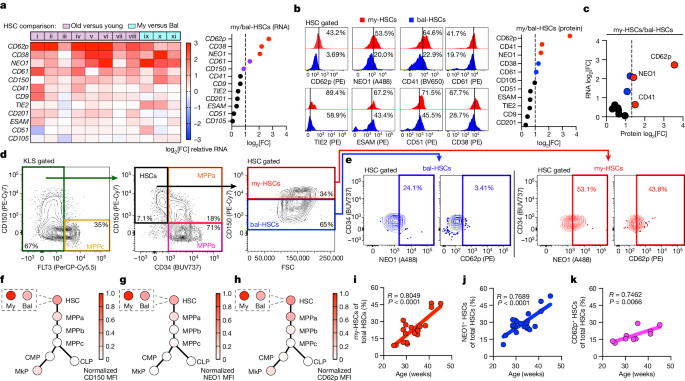Rejuvenating Aged Immunity by Depleting Myeloid-Biased Hematopoietic Stem Cells
Core Concepts
Depleting myeloid-biased hematopoietic stem cells rejuvenates aged immunity.
Abstract
Age-related changes in hematopoietic stem cells (HSCs) impact immune system aging. Depletion of myeloid-biased HSCs in aged mice restores youthful immune features and improves adaptive immune responses to viral infections.
Decreased lymphopoiesis and adaptive immunity with age.
Increased inflammation and myeloid pathologies in aging.
Balance between lymphoid and myeloid HSCs crucial for immune function.
Depletion of myeloid-biased HSCs in aged mice reverses immune aging.
Restoration of common lymphocyte progenitors, naive T cells, and B cells.
Improved primary and secondary adaptive immune responses to viral infections.
Implications for diseases influenced by myeloid-biased HSC dominance.
Depleting myeloid-biased haematopoietic stem cells rejuvenates aged immunity - Nature
Stats
Age-related changes in populations of self-renewing hematopoietic stem cells (HSCs) are thought to underlie immune system aging.
Ageing is associated with increased proportions of myeloid-biased HSCs, leading to decreased lymphopoiesis and increased myelopoiesis.
Depletion of myeloid-biased HSCs in aged mice restores youthful immune features.
Quotes
"Depletion of my-HSCs in aged mice restores characteristic features of a more youthful immune system."
"Depletion of my-HSCs in aged mice improves primary and secondary adaptive immune responses to viral infection."
Key Insights Distilled From
by Jason B. Ros... at www.nature.com 03-27-2024
https://www.nature.com/articles/s41586-024-07238-x
Deeper Inquiries
How can the findings on immune rejuvenation by depleting myeloid-biased HSCs be translated into clinical interventions?
The findings suggesting immune rejuvenation by depleting myeloid-biased hematopoietic stem cells (HSCs) present exciting possibilities for clinical interventions. One potential application could involve developing targeted therapies that specifically eliminate myeloid-biased HSCs in aged individuals. This could be achieved through the use of antibodies or other agents that selectively target and deplete these cells while preserving the balance of lymphoid-biased HSCs. By doing so, it may be possible to restore a more youthful immune system in elderly patients, characterized by increased lymphopoiesis, enhanced adaptive immune responses, and reduced inflammation. Clinical trials could be designed to test the efficacy and safety of such interventions in improving immune function and overall health in the elderly population.
What potential challenges or drawbacks might arise from eliminating myeloid-biased HSCs in aged individuals?
While the idea of eliminating myeloid-biased hematopoietic stem cells (HSCs) to rejuvenate the immune system in aged individuals is promising, several challenges and drawbacks may need to be considered. One potential concern is the unintended consequences of disrupting the balance between myeloid and lymphoid cell production. Myeloid cells play crucial roles in immune responses, inflammation, and tissue repair, so eliminating myeloid-biased HSCs could potentially lead to impaired immune function or compromised healing processes. Additionally, the long-term effects of depleting myeloid-biased HSCs on overall hematopoietic function and the risk of developing hematologic disorders need to be thoroughly evaluated. Furthermore, the specificity and safety of the methods used to target and deplete myeloid-biased HSCs must be carefully assessed to minimize off-target effects and potential harm to the patient.
How can the concept of stem cell balance in immune function be applied to other areas of medical research or treatment?
The concept of stem cell balance in immune function, as demonstrated by the interplay between lymphoid-biased and myeloid-biased hematopoietic stem cells (HSCs), holds significant implications for other areas of medical research and treatment. Understanding and manipulating the balance of stem cell populations could have broad applications in regenerative medicine, cancer therapy, and autoimmune diseases. For instance, in cancer treatment, targeting and depleting cancer stem cells while preserving healthy stem cells could improve therapeutic outcomes and reduce the risk of relapse. In regenerative medicine, modulating the balance of stem cells could enhance tissue repair and regeneration. Additionally, in autoimmune diseases, restoring the balance of immune cell production could help regulate aberrant immune responses and reduce inflammation. Overall, the concept of stem cell balance in immune function opens up new avenues for innovative approaches in various medical fields.
0
